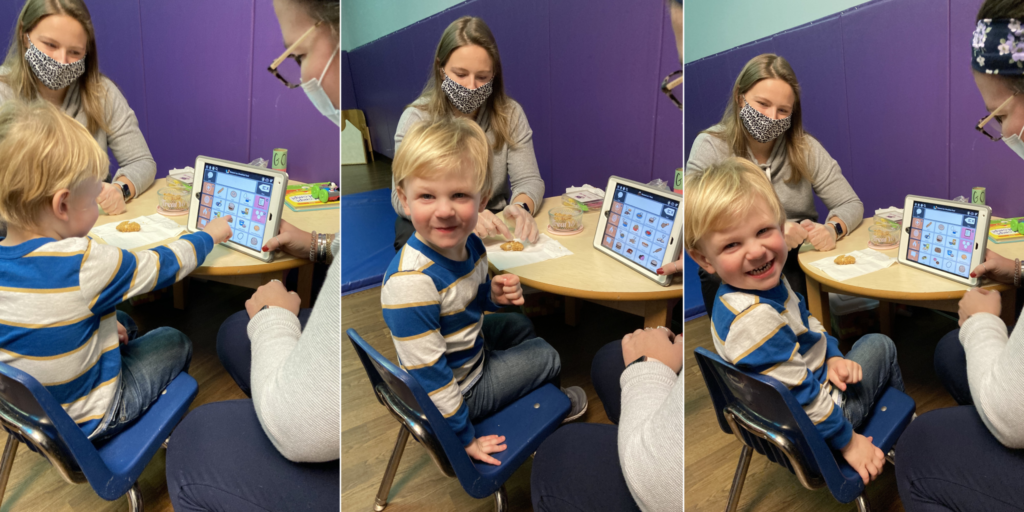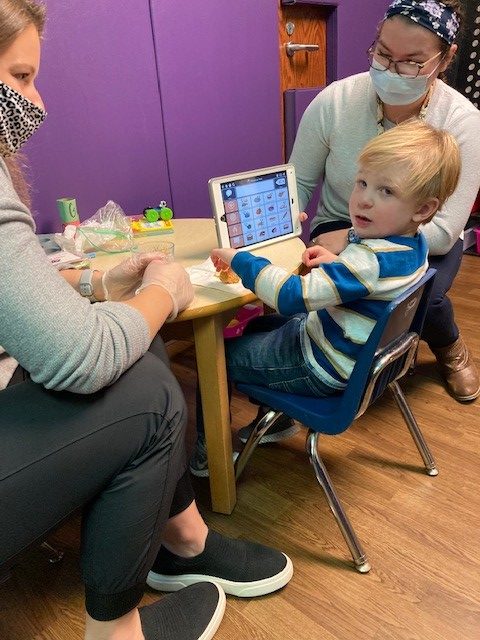Schreiber mom: From advocate for others to advocate for son
December 17, 2021
Amanda Katchur is a psychologist who has been an advocate for services that support children for a number of years. Now, she’s learning to advocate for her own child, and that’s a completely different experience.
It’s one thing to know professionally the impact that Schreiber’s services and Lancaster County’s Early Intervention program have on families. It’s another thing to see it personally.
Her daughter Bethany was diagnosed as an infant with torticollis, a condition in infants that causes a baby’s head to tilt constantly to one side. Thanks to the work of Schreiber therapists, Bethany’s torticollis is gone and she runs, jumps and dances just like any 6-year-old little girl, Amanda said.
Bethany’s little brother Leo, 3 years old, has an autism diagnosis, was born with mild hearing loss and also had some torticollis as an infant. The three issues combined have left him behind in several areas of development. When it was time for Leo to receive services through Early Intervention, at 6 months old, Amanda had no hesitation.
“I knew we wanted to come back (to Schreiber) because we had such a positive experience with Bethany,” Amanda said.
Leo has been in good hands his therapy services started. Catherine Donahue was his Schreiber’s Early Intervention specialist for home visits. Dorlas Riley was his speech-language pathologist. Denisha Roberts worked with him in physical therapy. And Bernie Hershey has been his occupational therapist.
I like to think that we’ve been fortunate to have, like, the dream team…, with all the experience they have with his issues.
AMANDA KATCHUR
“They were all really great,” Amanda said. “I like to think that we’ve been fortunate to have, like, the dream team to be quite honest with you, with all the experience they have with his issues.”
COVID has, at times, made the therapy more challenging, like when the family had to switch to telehealth services for a time. At those moments, she could see the lengths the Schreiber team would go to for a child.
When telehealth sessions switched back to in-person visits, the change and the lack of consistency caused some challenges for Leo, as it does for many kids on the autism spectrum.
“Bernie showed up at one point at our house in costume as Jessie from “Toy Story” to try to re-engage after telehealth with Leo a little bit,” Amanda said. “They just really always made an attempt (to find what) he was interested in and get into his world, which I appreciated so much.”
During a recent therapy session at Schreiber, Leo worked with Marli Hess, an intern in Occupational Therapy, and Maddy Sova, a speech-language pathologist. They were trying to help him become more comfortable with a different kind of food – in this case, a chicken nugget – and to improve his language skills by using a smart tablet to respond to questions.
“We are working on communication in whatever way Leo feels most comfortable,” Amanda said. “Today, you saw him working on some eating, because eating has been a struggle for us, too. So he’s been working on increasing his tolerance for different foods and different textures and things like that. But communication has been, I would say, the biggest one.”
Mom was impressed with the way Leo greeted a visitor to the session, smiling and waving. “He probably wouldn’t have done that six months ago,” she said.
EI services do make a difference

Mandy Kolb Lyons is a coordinator in Lancaster County’s Early Intervention services program. She sent this email to agencies that provide Early Intervention services after a recent presentation to the agencies by Amanda Katchur. Amanda presented at the PA Statewide Interagency Coordinating Council (SICC) meeting to share her family’s story and how Early Intervention supported them.
Here’s an excerpt from Mandy’s email:
“Amanda shared numerous examples of how you helped to coach, support, empower and guide her and her family. Amanda beamed as she shared the journey that her son and family had with Early Intervention and mentioned a few times how Early Intervention supported her entire family, including Leo’s big sister! Not only did Leo grow and progress throughout services, his entire family did. We can only hope that every family that participates in Early Intervention can walk away feeling similarly to how Amanda and her family did after participating in our services.”